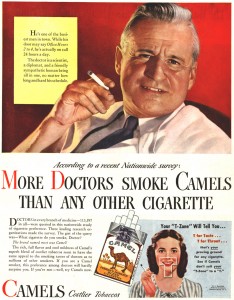In the 1930s and 1940s, a variety of cigarette brands emerged in the American market that dazzled and wooed smokers; at the same time, public anxiety concerning the health risks of cigarette smoking was on the rise. In the midst of this situation, the Renault Company launched a vigorous “doctors recommend” movement in which they organized three independent research institutions and polled more than 100,000 doctors in the United States to recommend Camel brand cigarettes. Renault, with their pervasive media advertising, vigorously promoted the slogan that “more doctors choose Camel” than any other brand. Ad campaigns developed in the early 1950s featured images of doctors to reassure consumers that Renault’s brands were safe. By using physicians’ endorsements to assuage the consumers’ concerns, Reynolds brought immediacy and credibility to their claims. Renault effectively resolved any fears that the consumers may have harbored concerning the harmfulness of smoking by showing physicians themselves smoking. In hindsight, Renault’s decision to use physicians to extend the popularity and safety of their products violated the morality against ethical advertising, but to Renault’s credit their campaign and marketing strategy had proved effective. The tobacco company took advantage of the unethical advertisements to promote their cigarette brand and their popularity rocketed. Renault’s “propaganda” successfully attracted more consumers and increased their profits dramatically.
-
Recent Posts
Recent Comments
Archives
Categories
